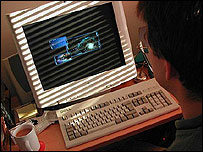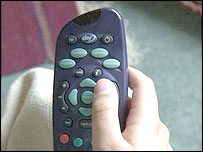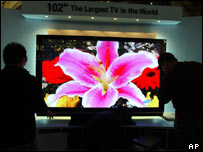
IPTV should help our hardware and software converge
|
Internet Protocol TV - telly over a phone or cable line - is a buzzword technology that we will be hearing a lot more about in the next fives years.
More than six million UK households now have broadband net. By the middle of 2005, it is estimated that 50% of all UK net users will be on broadband.
About 60,000 new connections are made every week in the UK.
And with those connections getting faster and fatter, telecoms firms are keen to find new ways to use them.
Q: What is IPTV?
IPTV - Internet Protocol Television - is basically a way of getting TV transmitted over high-speed net connections.
It is still in its infancy in most parts of the world.
Conventional TV that we are used to is usually sent to our sets by cable, satellite, or through the air, as analogue or digital signals.
Like VoIP (voice over internet protocol), IPTV means video data is sent across the net in packets of data.
It can then be stored on a server and sent to computers or straight to special set-top boxes, over ADSL (asymmetric digital subscriber lines), or cable lines.
IPTV can be in the form of live TV, but more usually as stored video - sometimes known as video on demand (VOD).
To watch IPTV, a person sitting at home needs a computer, or set-top box, plugged into the TV.
Q: Why should I know about it?
Analysts and experts, from telecommunications companies to communications watchdog Ofcom, predict that it is the future of TV.
It is estimated that 4.5 million homes in Europe will have net TV services by 2008.
Broadband connection speeds, capacity, and the number of subscribers, are climbing rapidly.
Coupled with that, better video compression technology allows standard- and high-definition video to be delivered using broadband technologies.

More power and choice will be in the hands of the viewer
|
IPTV not only gives people something to do with their fast connections, but it also means that the companies can make more money out of providing these services too.
There is also limited space for more TV digital or analogue channels, so being able to use the net as another way to distribute programmes is seen as extremely attractive and almost limitless.
It means that anyone with a server could set themselves up as an IPTV service, in theory. If more "channels" are needed, it is simply a case of more server space.
Q: When I be able to watch it?
Currently, there are two IPTV services up and running in the UK.
Home Choice lets people watch more than 10,000 hours of programming all available instantly. It can transmit 1,000 films, TV shows, and more than 3,000 music videos.
The programmes can be paused, and re-wound, as they can with personal digital video recorders, like the Sky+ box.
There is also an IPTV service in Hull run by telecoms company Kingston Communications.
Called Kit (Kingston Interactive TV), it delivers programmes and subscription channels to people through the phone line.
But realistically, until broadband speeds are a standard above the current entry level of 1Mbps of 2Mbps, it is unlikely to be widespread.
At some point in the five to seven year bracket, according to Ofcom, there will be a single pipe coming into your house.
That will be capable of carrying your voice calls - VoIP - your standard broadband data connection, and your TV and net radio stations.
Q: What does it mean for my telly?
It means that there could be a lot more choice of what to watch and when.
It is all part of the changing TV technology landscape and, like personal digital video recorders, it gives people much more control over TV.
Broadcasters see this both as a threat and an opportunity.
When it really takes off in about five years' time, it also means that the technology we use to watch telly may change too. More TV sets are already being built with digital set-top boxes integrated into them.
This could bring about more convergence between our hardware, such as computers, TV sets, digital video recorders, and set-top boxes, as well as software and applications that we already use on computers.
It also means that much high-quality programmes, like high-definition films, could eventually be sent to people over the net.
But any content, such as TV programmes, transmitted over the same lines we get net access from, will be outside of communications' watchdog Ofcom's regulation.
Currently, UK broadcasters need a licence to broadcast. This means they have to abide by certain rules, like taste and decency, and the watershed.
IPTV will be outside of those regulation, according to the 2003 Communications Act.
There is also some suggestion that the government is considering a "PC Tax" for those who do not own a TV but who watch TV shows over the net.
Q: Who is doing it?
It is generally still early stages for IPTV around the world.

IPTV will change the way we get TV programmes
|
Across Europe, more than 30 telcos and network operators are testing IP TV services.
Fast Web in Italy is the biggest success story so far, and France Telecom launched an IPTV service in late 2003. Called MaLigne TV, the service can be accessed by more than 10 million households in France.
Other European telcos, such as Belgacom, Deutsche Telekom, KPN, Swisscom, Telefonica, and Telenor, have also been testing IPTV services.
Microsoft has signed up several telecoms companies, such as SBC Communications, BellSouth and Telecom Italia, to help build a system using its own software to deliver IPTV to people.
In the UK, several telecoms companies such as BT are planning such services, but it is still early days.
BT is in talks with broadcasters to make sure it has content for its broadband customers. But BT has said it does not plan to become a broadcaster itself.
Rather, it and other net service providers, could offer an IPTV service for time-delayed programmes, like football matches.
